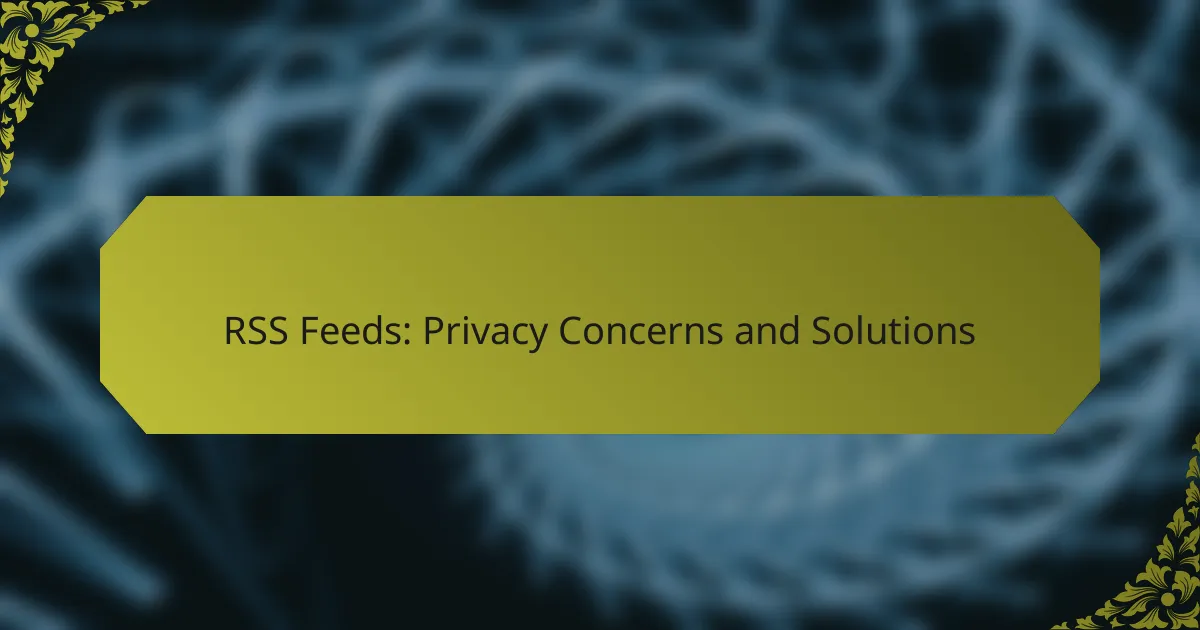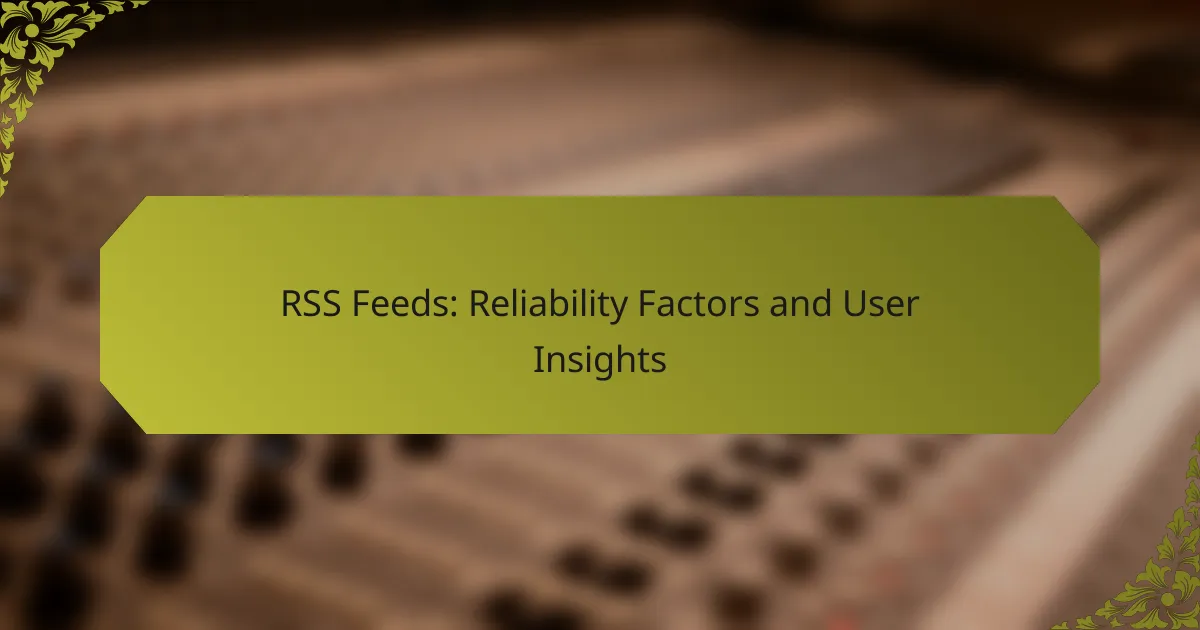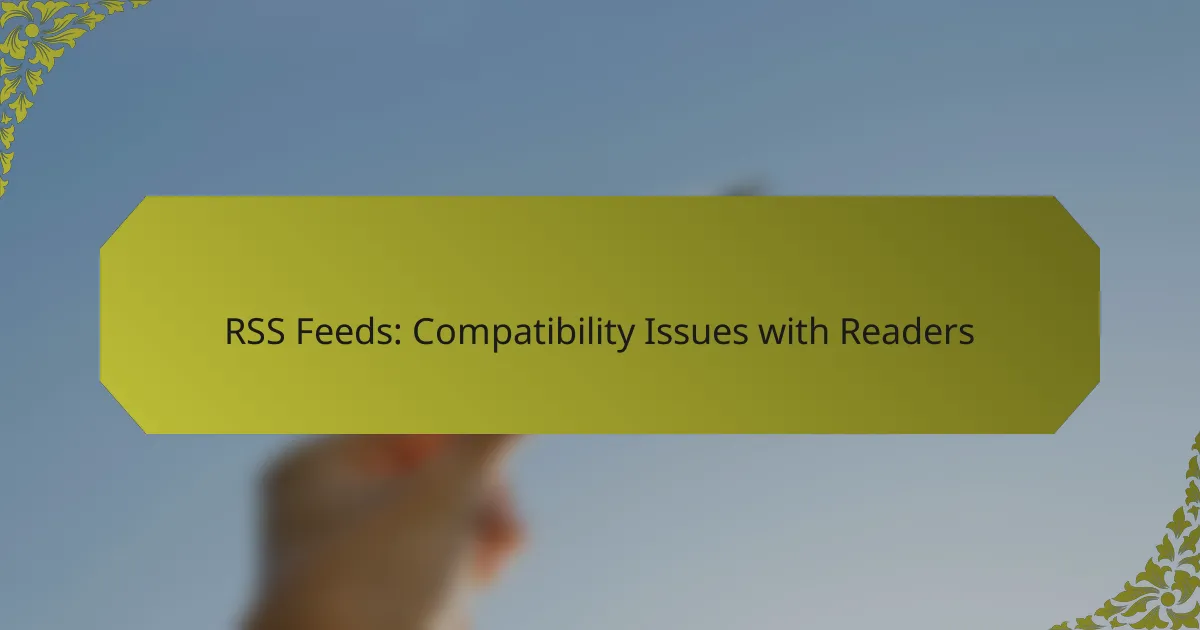RSS feeds offer a convenient way to access content, but they also pose significant privacy concerns, such as data tracking and the potential exposure of personal information. To mitigate these risks, users can adopt various tools and practices, including encrypted RSS readers and anonymization techniques. By being proactive about their privacy settings, individuals can enjoy the benefits of RSS technology while protecting their personal data.
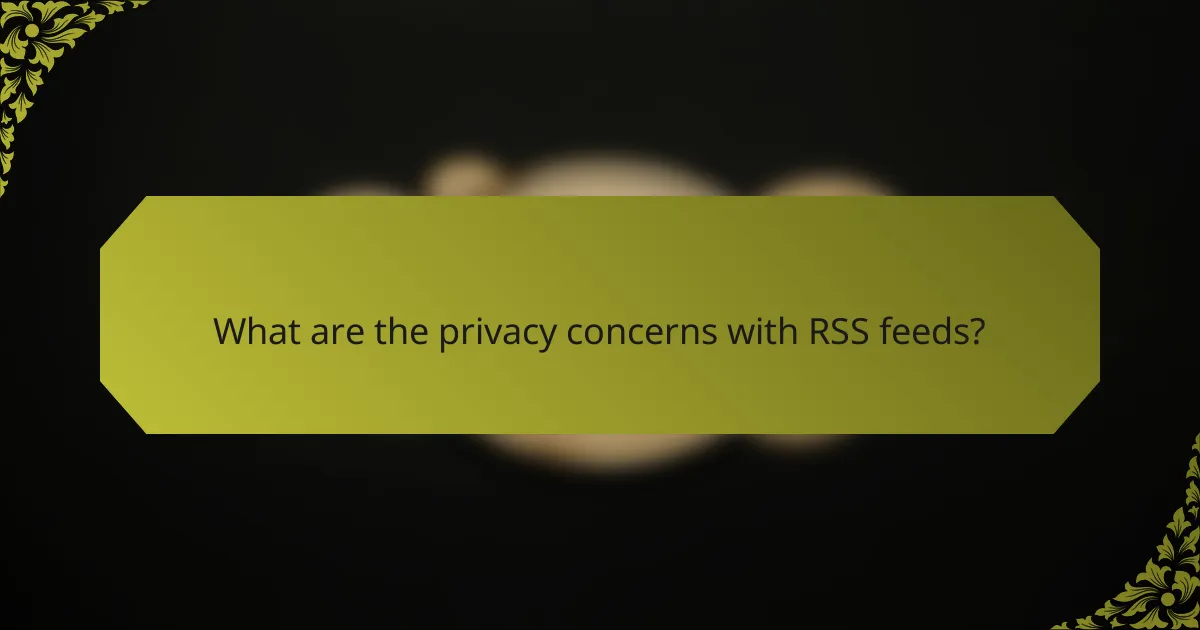
What are the privacy concerns with RSS feeds?
RSS feeds can raise several privacy concerns, primarily related to data tracking, exposure of personal information, and unsecured feed URLs. Users should be aware of these issues to protect their privacy while enjoying the benefits of RSS technology.
Data tracking by RSS readers
Many RSS readers track user behavior to enhance their services, which can lead to privacy issues. This tracking often includes monitoring which feeds are accessed, how often they are read, and even user preferences. Users should choose RSS readers that prioritize privacy and offer options to limit data collection.
Some popular RSS readers may utilize cookies or other tracking technologies, which can compromise user anonymity. Opting for readers that support anonymous browsing or do not require personal information can mitigate these risks.
Exposure of personal information
RSS feeds can inadvertently expose personal information if they include identifiable data or if users subscribe to feeds that reveal their interests. For instance, if a feed URL contains a username or other personal identifiers, it can be accessed by anyone who has the link. Users should be cautious about the feeds they subscribe to and consider using pseudonymous accounts.
Additionally, public feeds can be indexed by search engines, making it easier for others to discover personal interests or affiliations. Using private or encrypted feeds can help protect sensitive information from being publicly accessible.
Unsecured feed URLs
Unsecured feed URLs can pose a significant privacy risk, as they may be intercepted by malicious actors. If a feed is transmitted over an unsecured connection (HTTP instead of HTTPS), it can be vulnerable to eavesdropping. Users should ensure that their RSS feeds use HTTPS to enhance security and protect their data from unauthorized access.
Furthermore, users should be cautious about sharing feed URLs, especially in public forums. Keeping feeds private or using secure sharing methods can help prevent unauthorized access to personal information.
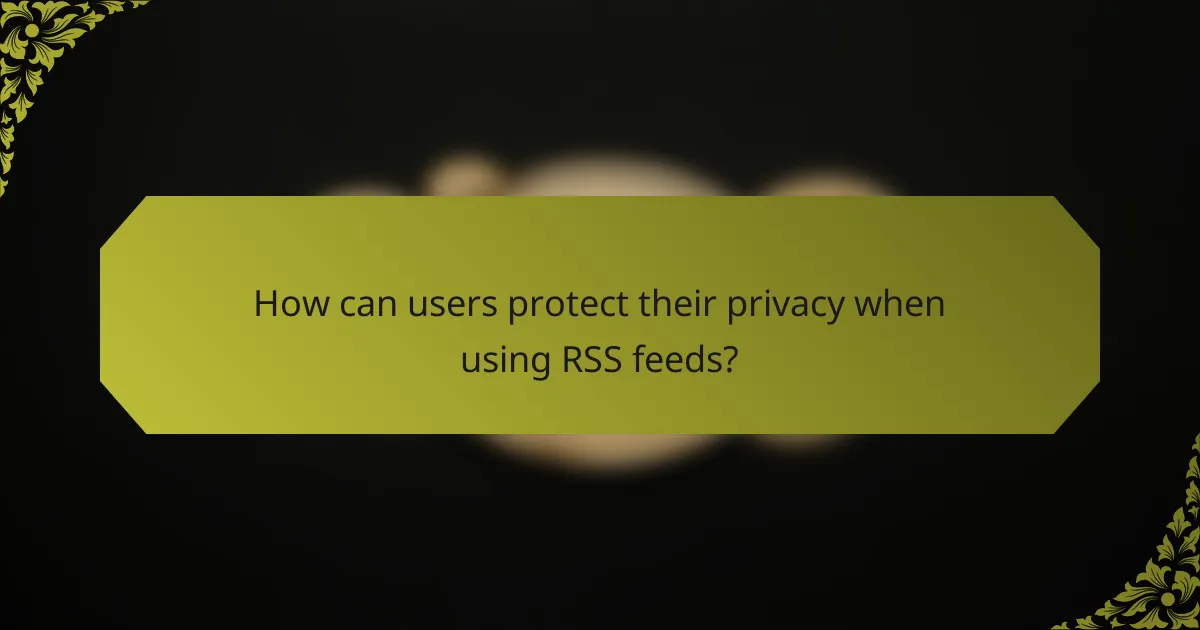
How can users protect their privacy when using RSS feeds?
Users can enhance their privacy while using RSS feeds by adopting specific tools and practices. This includes utilizing encrypted RSS readers, implementing anonymization techniques, and regularly updating privacy settings to safeguard personal information.
Use encrypted RSS readers
Encrypted RSS readers help protect user data by ensuring that the information exchanged between the user and the feed is secure. These readers often use end-to-end encryption, making it difficult for third parties to intercept or access the content.
When selecting an encrypted RSS reader, look for options that prioritize user privacy and do not track your reading habits. Popular choices include Feedly Pro and Inoreader, which offer secure connections and additional privacy features.
Implement feed anonymization techniques
Anonymization techniques can mask your identity while using RSS feeds. This can involve using proxy servers or VPNs to obscure your IP address, making it harder for websites to track your activity.
Consider using services that strip identifying information from the feeds you subscribe to. Tools like Feedbin offer options to anonymize your feed requests, enhancing your overall privacy while browsing content.
Regularly update privacy settings
Regularly reviewing and updating privacy settings in your RSS reader is crucial for maintaining control over your data. Check for any new privacy features or settings that may have been introduced since your last review.
Make it a habit to adjust settings related to data sharing, notifications, and tracking. This proactive approach can help mitigate risks associated with data leaks or unwanted tracking by third parties.
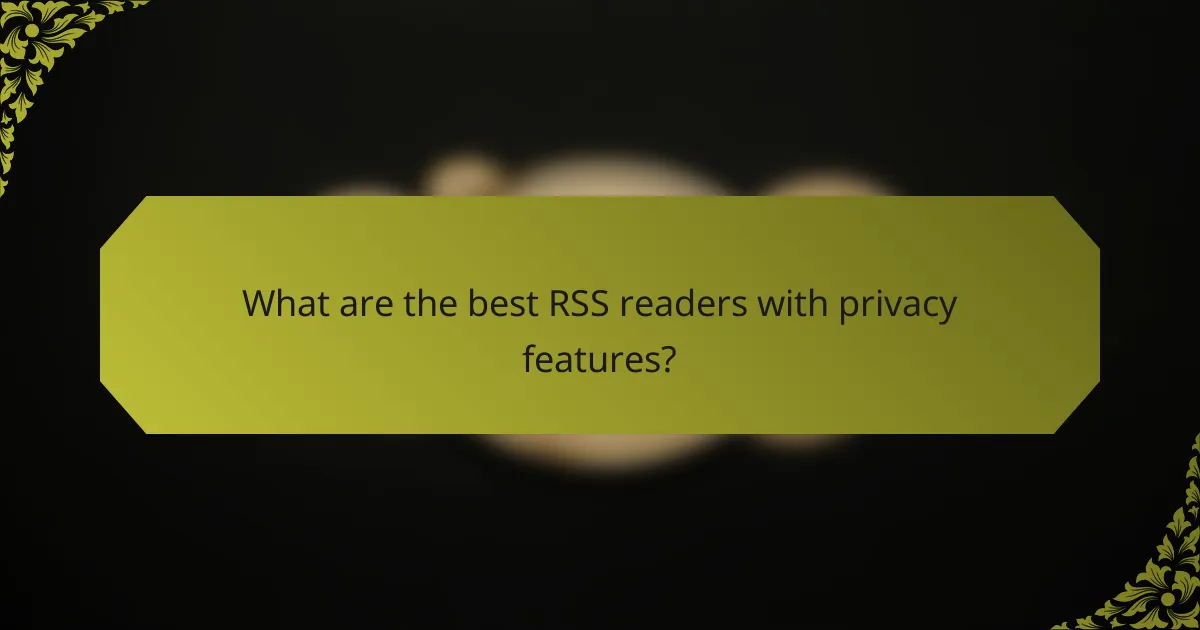
What are the best RSS readers with privacy features?
Several RSS readers prioritize user privacy by minimizing data collection and offering secure browsing options. Notable choices include Feedly Pro, Inoreader, and Newsboat, each providing unique features that enhance privacy while delivering news content.
Feedly Pro
Feedly Pro is a premium RSS reader that offers enhanced privacy features, such as secure HTTPS connections and the ability to connect to third-party services without compromising your data. It allows users to customize their feeds while ensuring that personal information remains protected.
One key aspect of Feedly Pro is its ability to integrate with various applications while maintaining a focus on user privacy. Users can manage their subscriptions and preferences without worrying about invasive tracking. Consider using Feedly Pro if you seek a balance between functionality and privacy.
Inoreader
Inoreader is another excellent option for users concerned about privacy. It offers features like end-to-end encryption and the ability to read feeds offline, reducing the risk of data exposure. Inoreader also allows users to control their data sharing preferences, giving them peace of mind.
This reader supports a wide range of formats and sources, making it versatile for various content types. Users can take advantage of its filtering and organizing tools without sacrificing their privacy. Inoreader is ideal for those who want a comprehensive reading experience with robust privacy controls.
Newsboat
Newsboat is a command-line RSS reader that stands out for its focus on privacy and minimalism. Being open-source, it allows users to inspect the code and ensure that no unwanted data is collected. Newsboat runs locally, which means your reading habits are not tracked by external servers.
This reader is particularly suitable for tech-savvy users who prefer a lightweight solution. It supports various feed formats and can be customized extensively. If you value privacy and are comfortable with command-line interfaces, Newsboat is a strong choice.
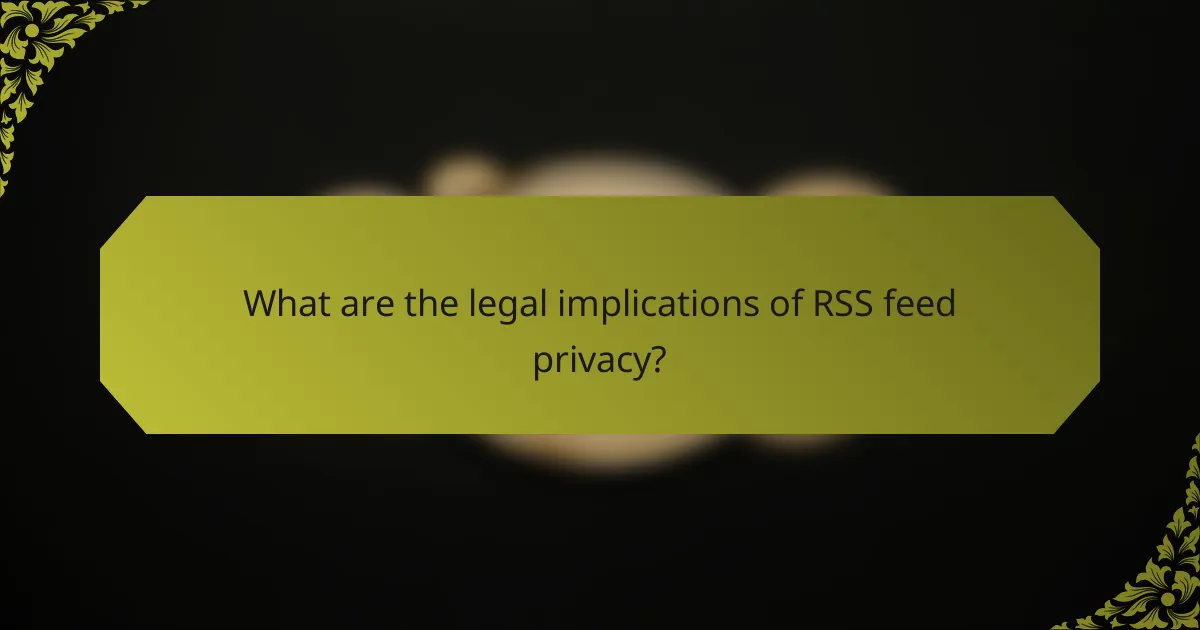
What are the legal implications of RSS feed privacy?
The legal implications of RSS feed privacy primarily revolve around data protection regulations that govern how personal information is collected, stored, and shared. Organizations must ensure compliance with laws like the GDPR and CCPA to avoid penalties and protect user privacy.
GDPR compliance requirements
The General Data Protection Regulation (GDPR) mandates that organizations collecting personal data through RSS feeds must obtain explicit consent from users. This includes informing users about the data being collected, its purpose, and how it will be used.
Additionally, organizations must implement measures to ensure data security and provide users with the right to access, rectify, or delete their personal information. Regular audits and updates to privacy policies are essential to maintain compliance.
Impact of CCPA on RSS feeds
The California Consumer Privacy Act (CCPA) affects how businesses handle personal data collected via RSS feeds, particularly for California residents. Under CCPA, users have the right to know what personal data is being collected and the ability to opt out of its sale.
Businesses must provide clear notices about data collection practices and ensure that users can easily exercise their rights. Failing to comply with CCPA can result in significant fines, making it crucial for organizations to adapt their RSS feed practices accordingly.
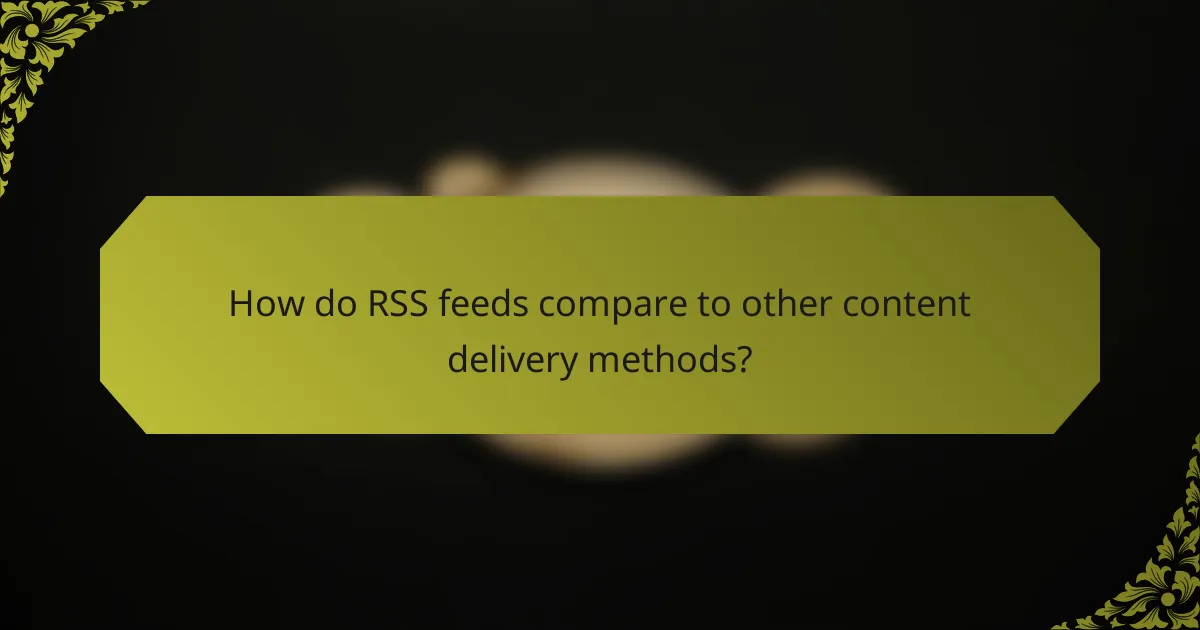
How do RSS feeds compare to other content delivery methods?
RSS feeds offer a unique way to deliver content directly to users without relying on email or social media platforms. They allow users to subscribe to updates from multiple sources in one place, providing a streamlined experience that prioritizes user control over content consumption.
RSS vs. email newsletters
RSS feeds and email newsletters both deliver content, but they differ significantly in user engagement and control. With email newsletters, users must provide their email addresses, which can raise privacy concerns and lead to spam. In contrast, RSS feeds do not require personal information, allowing users to subscribe anonymously.
Email newsletters often have a more curated approach, with content tailored to specific interests, while RSS feeds provide real-time updates from various sources. This means RSS users receive all updates, which can sometimes lead to information overload if not managed properly.
RSS vs. social media feeds
RSS feeds and social media feeds serve similar purposes in delivering content, but they operate on different principles. Social media platforms often curate content based on algorithms, which can limit exposure to diverse sources and introduce bias. RSS feeds, however, allow users to choose exactly which sources to follow, ensuring a broader range of perspectives.
Additionally, social media feeds can be influenced by advertising and sponsored content, which may detract from the user experience. In contrast, RSS feeds provide a more straightforward delivery of content without commercial interruptions, making them an appealing option for users seeking unfiltered information.
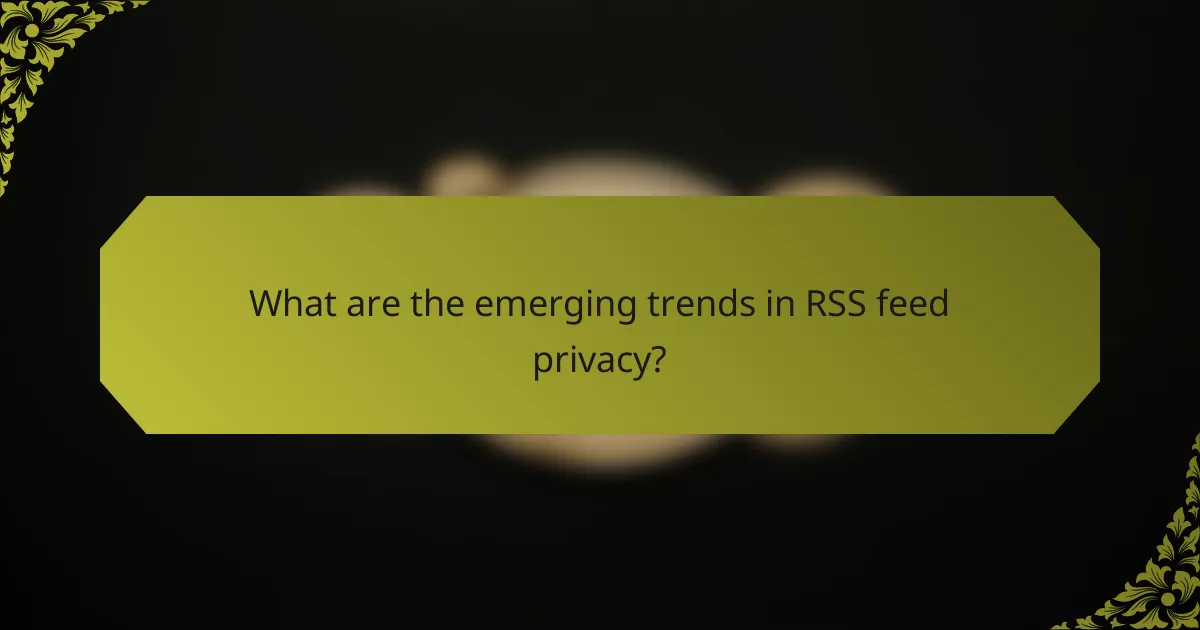
What are the emerging trends in RSS feed privacy?
Emerging trends in RSS feed privacy focus on enhancing user security and control over personal data. As concerns about data privacy grow, technologies and practices are evolving to protect user information while still delivering relevant content.
Increased use of privacy-focused technologies
Privacy-focused technologies are becoming integral to RSS feeds, with tools like VPNs and encrypted connections gaining popularity. These technologies help mask user identities and secure data transmission, reducing the risk of interception.
Additionally, browser extensions and applications that block tracking scripts are increasingly used to enhance privacy while consuming RSS feeds. Users are encouraged to explore these technologies to safeguard their online activities.
Integration of blockchain for secure feeds
Blockchain technology is being integrated into RSS feeds to provide a decentralized and secure way to share content. This approach ensures that data is immutable and can be verified, which enhances trust among users and content creators.
By utilizing blockchain, RSS feeds can offer features like content ownership verification and transparent tracking of data usage. This not only protects user privacy but also empowers creators by ensuring they maintain control over their work.
Growing demand for user-controlled data
There is a rising demand for solutions that allow users to control their data within RSS feeds. Users want the ability to manage what information is shared and with whom, leading to the development of customizable privacy settings.
Platforms that prioritize user-controlled data are likely to attract more subscribers. Users should look for RSS services that offer granular privacy options, enabling them to tailor their experience according to their comfort level with data sharing.
